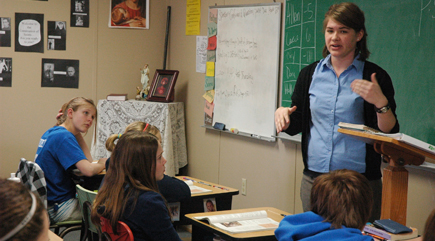
OUR SUNDAY VISITOR'S COVERAGE: Prayers for the Pope | OSV President Reflects on Benedict's Pontificate | Papal Transition 2013 News Round-Up
It is an announcement that has sent shock waves through the Church. The resignation of Pope Benedict XVI is unprecedented in the past 600 years. The announcement of the Pope’s departure has left many people asking, “Can a pope resign?” and “What comes next?” In religion class, children and teens learn that election to the papacy is for a lifetime. What are we to think about this, and what do we tell the children we catechize?
Although a pope ordinarily serves until his death, he may, as in the case of Pope Benedict, step aside if his health is an obstacle to fulfilling his mission. A familiar parallel would be the protocol for the resignation of a Supreme Court justice in U.S. Government. Although these justices are appointed for life, they can step down if health issues keep them from carrying out their duties. Canon 332 §2 provides for the resignation of a pope, as long as it is made freely and communicated properly. This is why Pope Benedict says in his communiqué, “with full freedom I declare that I renounce the ministry of Bishop of Rome.”
Just as in the case of a pope’s death, a conclave of cardinals will be called, and a new pope will be elected. For all of the faithful, this is a time for prayer to the Holy Spirit, that God will guide the cardinals with wisdom and prudence as they elect the new successor to St. Peter. For those in catechetical ministry, this is also a time for educating those we serve about the protocol for a pope’s resignation and the process of electing a new pope. Here are some tips for talking about the pope’s resignation with children of various ages:
Age 6 and below: The experience of church for children this age is usually limited to their family’s own religious practice and their local parish. It’s difficult for them to conceive of a worldwide Church. However, we can say something like this, ”There is a man, called the pope, who is the leader of all of the Church on earth – all of the parishes in every town – including our parish. The leader right now is Pope Benedict. He is very sick, so he has decided to leave this job and let someone else be leader. That way, Pope Benedict can get some rest, and the new leader will be able to do all of the things needed for this very big job.”
Ages 7 to 10: Children this age often know some information about the pope and his role. They also tend to be very rule-oriented, so they will need to know that even though a pope is usually chosen for life, it’s not “against the rules” for the pope to resign. He can do so if he feels he cannot carry out all of his responsibilities. Then, a new pope is chosen by all of the cardinals from around the world, who will meet in Rome for a conclave. Encourage children this age to pray for the cardinals as the elect the new pope, that the Holy Spirit will guide them as they choose a strong and faithful leader for the Church.
Ages 11 and above: If they have been in religion classes for most of their school years, kids this age usually know more about the pope and the process for his election. They might be more aware of various popes in history, including St. Peter and Pope John Paul II. It might be interesting for kids this age to know that the last pope to resign was Pope Gregory XII in 1415. He resigned for the good of the church during a time when there was conflict about who was the validly elected pope. Kids this age can also learn more about the conclave and even who will represent the church of the United States. Again, be sure to encourage them to pray that the Holy Spirit will guide the cardinal electors as a new leader is chosen.
It’s a confusing, but exciting time in the Church. We are grateful for the great service of Pope Benedict XVI, and look forward to greeting our new leader on that day when the conclave elects a new pontiff and we hear those joyful words, “We have a pope!”